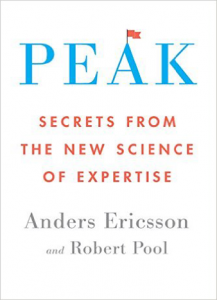
A topic not directly addressed in the course is the depth of learning for the students. I am not sure that better engagement necessarily leads to deeper learning of a topic; it might, but it could also lead to, well, greater engagement, meaning more time spent on the course. Not all learning activities lead to depth: they may be fun but ultimately only result in time spent.
It is vital that the learning activities lead to greater depth in understanding and application of the knowledge acquired and to greater versatility and expertise in the skills gained. The Swedish-American psychologist Anders Ericsson called training that leads to greater skills and understanding deliberate practice (see Anders Ericsson, Robert Poole, Peak: Secrets from the new science of expertise, HMH, 2016). Hence, it is the practice for expertise that should be considered also for university subjects. There is evidence from schools that deeper learning leads to more engagement and build self-confidence, in addition to better knowledge. This is alas in conflict with all the breadth requirements that are politically and socially mandated (for instance, in the Swedish school curriculum, even crafts has a theory part making it impossible for the practically inclined to get highest grade on excellent skills alone). At university, we are also requiring more and more breadth, which might be nice to have but ultimately is secondary to expertise.
My worry is that online learning invites more of breadth learning (easily done by linking to texts and videos) and that the blended teaching modes by themselves distract and do not lead to better and deliberate practice. This worry can be observed when browsing the many fun contributions of the PBL groups in ONL211. They must have enjoyed it, yet how did their work lead to deeper understanding of the teaching by blended learning and more skillful and appropriate use of online tools?
This said, I believe that the ONL211 has been a good start for a process to develop better courses for our students. The group discussions have been rewarding and I have seen them from the perspective of a student and course participant, which is useful; this is a perspective I cannot get when I am the teacher. Hence, the social aspect of learning is what I value most highly from the course. The possibility to use several tools, such as Padlet, Sway, Prezi and Perusall, has also been great. I only knew of some of them and had tested even fewer.
It has been a good and worthwhile course! Now I need to think about the application of what I have learnt in my own practice in order to get the students to get deeper into the subjects I teach. I have to do my own deliberate practice on improving my teaching.